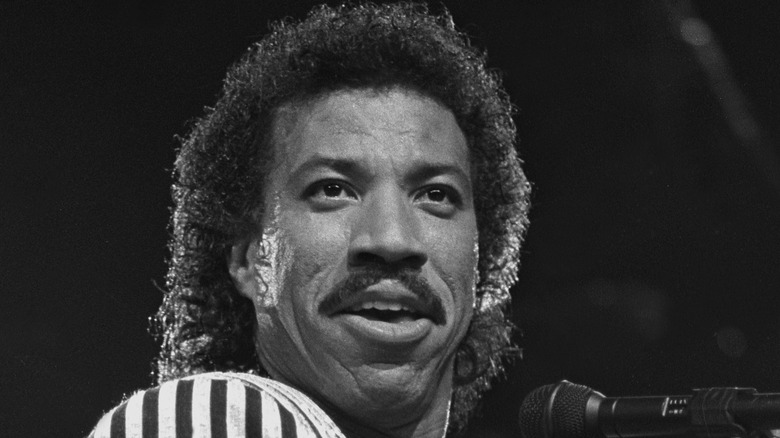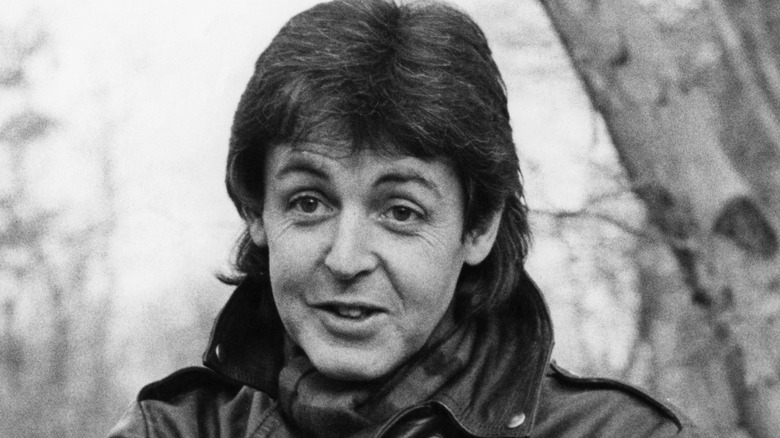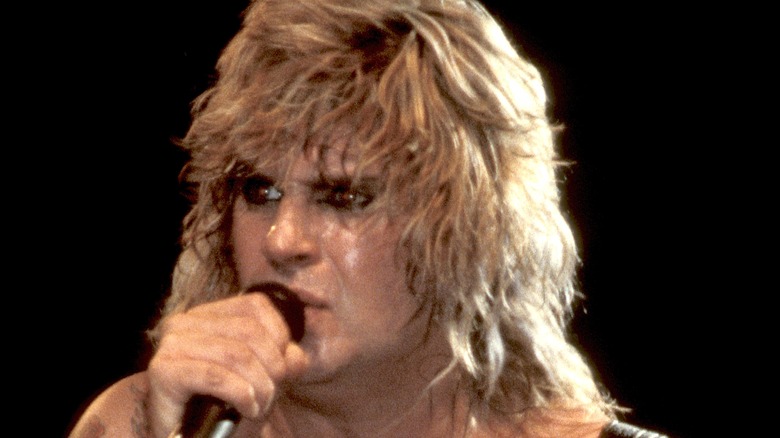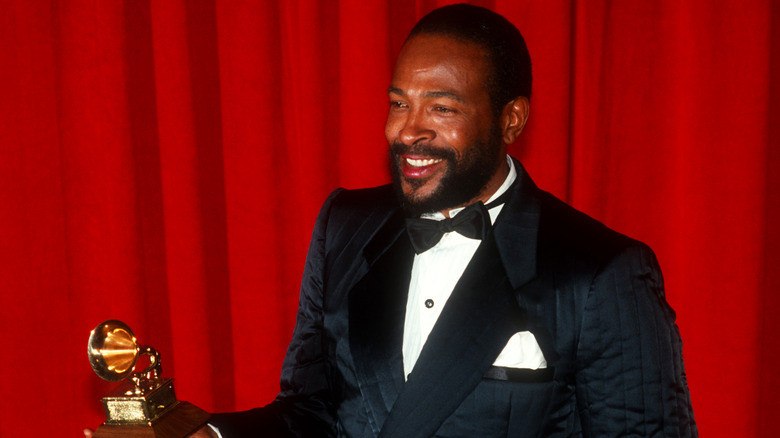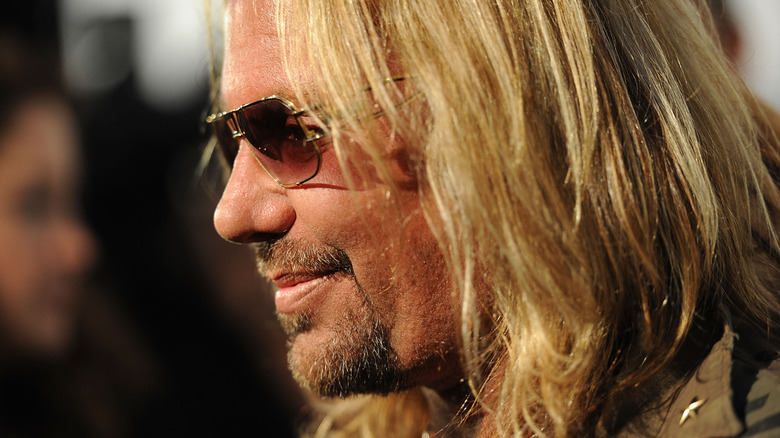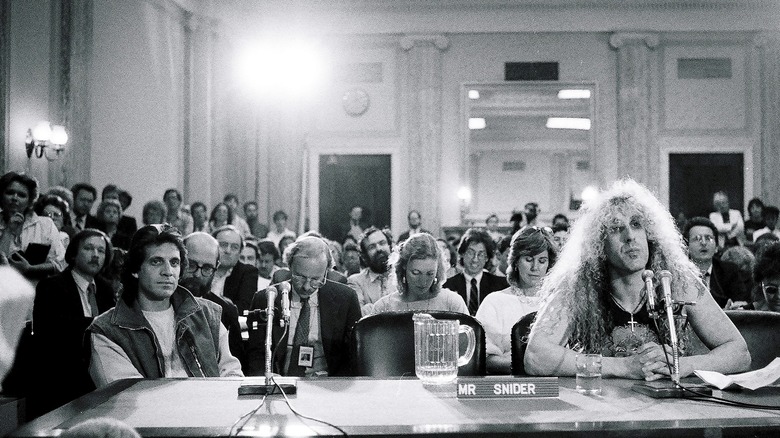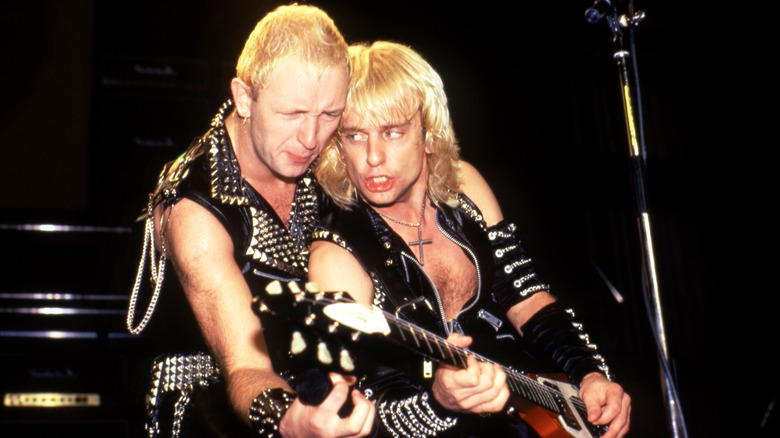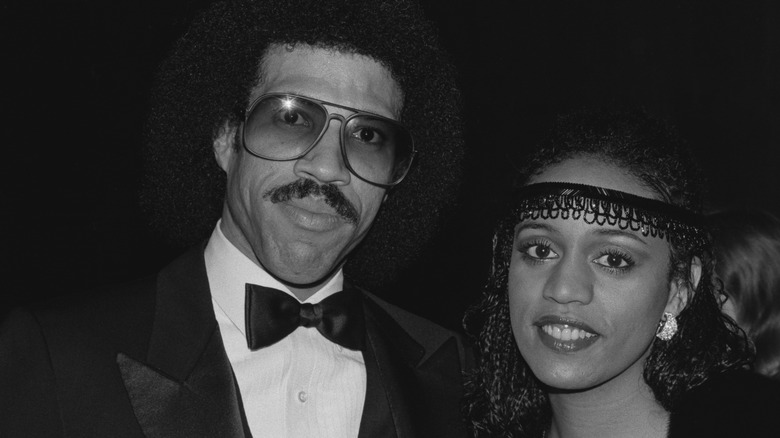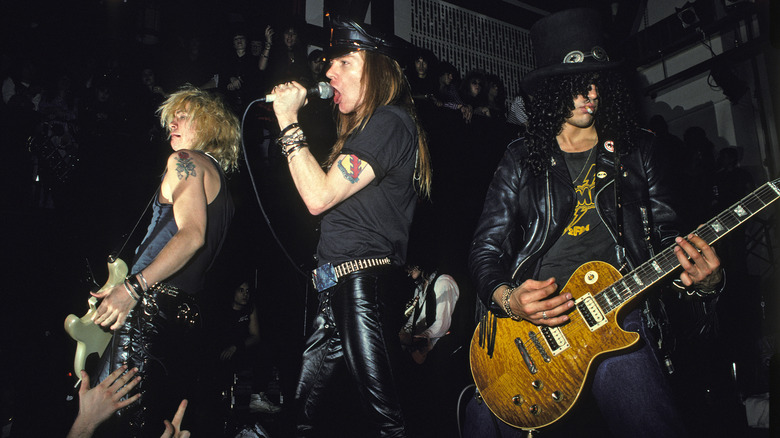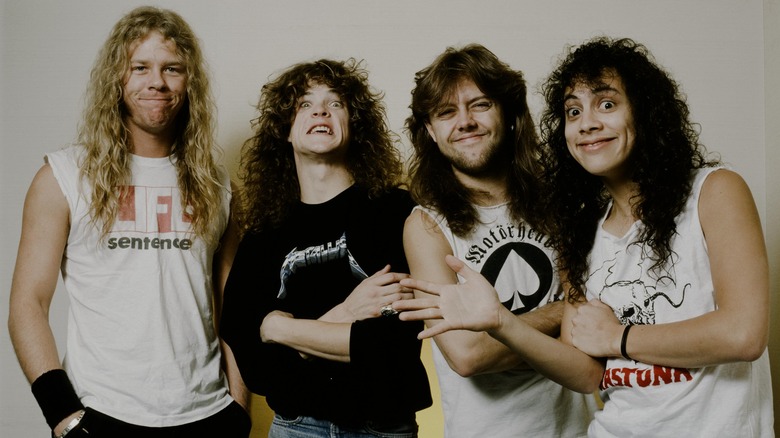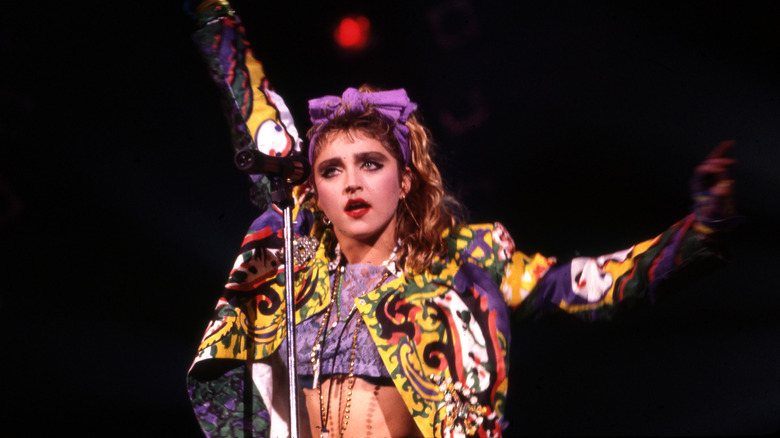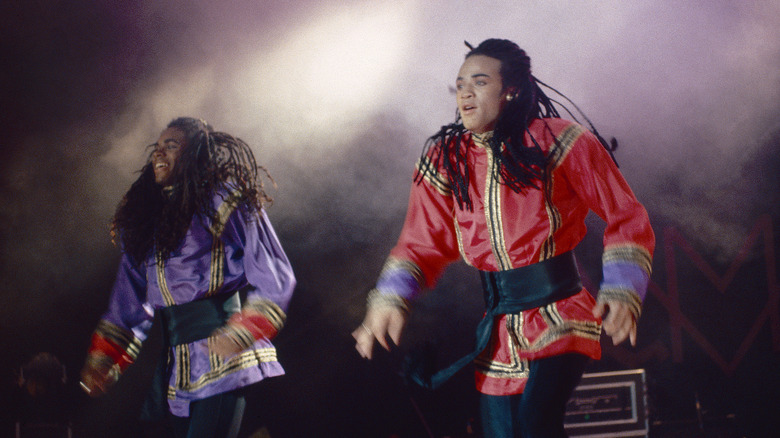The Biggest 1980s Music Scandals Explained
Give a talented kid with an ego millions of dollars and stick them in an industry where hard partying and sleeping around are not only permitted but arguably encouraged, and they're bound to get into trouble sooner or later. Meanwhile, mere mortals just can't stop eating up scandalous celebrity stories in gossip rags. And while the internet has certainly supercharged the junk news industry, tabloid culture has existed for quite a while now. The '80s may not have had Twitter, but it was still a decade of excess.
In the headlines, suprisingly or not, were Ozzy Osbourne, Madonna, and Lionel Richie, to name a few. And some of the scandals these musicians got up to still have people talking today.
Paul MCartney is jailed in Japan for possession
The Beatles don't typically make lists of the most notorious partiers and drug abusers in rock history, but History says that in 1980, Paul McCartney actually got in trouble for marijuana possession in Japan. And it wasn't a tiny amount, either: The article says he had a cool half pound of pot on his person when security busted him at Tokyo's Narita Airport. He insisted the drugs were for personal use, but skeptical authorities locked him away in the Tokyo Narcotics Detention Center for nine days nevertheless. Then, he was promptly freed and kicked out of the country, before going to court. No harm, no foul, just a funny story he gets to tell at parties.
Thing is, it could've been much worse. The amount of drugs he was caught with actually made a smuggling charge possible — that might have come with a seven-year sentence. But although the country doesn't mess around when it comes to drug trafficking, History says the Japanese wanted to avoid the inevitable fuss that would ensue if they actually locked up a living legend for nearly a decade.
Years later, in a deleted scene from "Carpool Karoake," McCartney told host James Corden about the incident, including the part where he learned he might be facing "seven years hard labor" from fellow inmates during his nine-day stint. "That was the sentence for what I'd done," he said. "I got out 'cause of my celebrity."
Ozzy Osbourne bites the head off a bat
Black Sabbath frontman Ozzy Osbourne is no stranger to outrageous controversy. There's the time he got arrested for urinating near the Alamo in 1982, according to Loudwire, the time he almost killed a guy by throwing a TV out of a hotel window (as per Daily Star), and when he admitted to the Mirror that he recently spent much of the pandemic lockdown shooting at birds and cats that wandered onto his property for fun. Other notorious Osbourne legends seem to be more myth than fact (his former guitarist Jake E. Lee told Tone-Talk that the infamous ant-snorting story seen in Mötley Crüe's "The Dirt" was mostly made up, for example). But still, it's clear this guy has seen and done some absolutely wild stuff.
But the Ozziest Ozzy moment of all time has to be the very real time when, while performing live onstage in 1982, he bit the head off a live bat. Thing is, it wasn't on purpose. As he explained to David Letterman years later, he thought the bat was a rubber prop someone in the audience had tossed onstage as a joke.
"Somebody threw a bat onstage," he told the talk show host. "And I thought it was one of these toy bats. So I picked it up, bite the thing's head off, and suddenly everyone's freaking out cause it's a real bat ..."
Marvin Gaye is shot dead by his own father
You'd think you only need one or two hit songs to be set for life. But money goes fast if you're not careful. History says that the "I Heard It Through The Grapevine" singer Marvin Gaye, a Motown icon with years of hits under his belt (and whose song "Sexual Healing" had gotten the 1982 Grammy for Best Male R&B Vocal Performance, according to their website), found himself living at home in 1983. To make matters worse, on top of the mental health, substance abuse, and financial struggles that put him in that position, he and his father didn't get along. History says Marvin Gaye's father, Marvin Gay (the singer added the "e" to his own name) was an abusive alcoholic who, rather than being proud of his son's success, may have actually been jealous of it.
Earlier reports indicated growing tensions and assaults, but on April 1, 1984, it got deadly. As The New York Times reported shortly after the incident, police responded to reports of what they called a "verbal dispute that led to a physical altercation," where they realized Gay had shot his son.
According to Frankie Gaye, who wrote about holding his brother as he died that night in "Marvin Gaye: My Brother," the singer's final words were, "I got what I wanted ... I couldn't do it myself, so I made him do it."
Vince Neil's drunk driving turns tragic
Partying until the cops showed up was the price of entry into the '80s metal scene. And few rockers partied harder than Mötley Crüe, whose debauched exploits have become the stuff of rock legend.
But on December 8, 1984, tragedy struck. Ultimate Classic Rock says the Crüe had taken Finnish glam rockers Hanoi Rocks under their wing during their first United States tour. Crüe lead singer Vince Neil and Hanoi Rocks drummer Nicholas Dingley, aka Razzle, both already drunk but out of booze to wash their booze down with, hopped into Neil's car to run to the liquor store. While speeding around Beverly Hills, Neil crashed his vehicle into another car. Neil survived but Razzle, just 24, died on the scene.
"Razzle disappeared," Hanoi Rocks guitarist Andy McCoy said to Metal Express (via YouTube). "So did Vince. [We] went looking for them. We drove past this accident, and I was like, 'What color was the car they were driving? Because we just passed a f***ing scene of an accident with a bright red sports car.' Then I saw Razzle's hat on the street."
"I wrote a $2.5 million check for vehicular manslaughter when Razzle died," Neil said in a 2005 interview with Blender magazine (as explained on ContactMusic). "I should have gone to prison. I definitely deserved to go to prison. But I did 30 days in jail and got laid and drank beer, because that's the power of cash. That's f***ed up."
Tipper Gore wages war on explicit music
According to Business Insider, after being shocked at the explicit lyrics featured on the Prince album she bought her kid, future second lady Tipper Gore led the Parents Music Resource Center in an effort to put content warnings on music deemed inappropriate for kids. Many musicians cried foul.
In the widely watched 1985 Tipper Gore-Frank Zappa Senate hearing, also known as the "rock-porn" hearing, Gore and the PMRC were opposed by the likes of Frank Zappa, John Denver, and Twisted Sister's Dee Snider, all of whom claimed to be championing artistic freedom. But Gore's organization eventually got parental advisory stickers slapped onto albums with mature content, as explained on the Recording Industry Association of America's website.
Gore has stuck to her guns in the decades since. She said to Rolling Stone back in 2015, "All of the artists and record companies who still use the advisory label should be applauded for helping parents and kids have these conversations about lyrics around their own values."
But interestingly, not everyone thought the stickers were really all that bad for the artists. It's not like the music was taken off the shelves. As MTV explains, the stickers make artists look cool and dangerous (undoubtedly what many of them were going for) and actually incentivized kids to buy the records.
Judas Priest's subliminal messaging scandal
The New York Times says a satanic panic gripped 1980s America, with millions convinced that crimes and child abuse were perpetrated by devil worshippers and cults. Simultaneously, metal bands were incorporating evil imagery, from the pentagram on Mötley Crüe's "Shout at the Devil" to Iron Maiden's 1982 record "Number of the Beast." Unsurprisingly, suburban conservatives and headbangers didn't exactly get along. Occasionally, the courts got involved.
Far Out Magazine says that on December 23, 1985, Raymond Belknap and James Vance were moved to take their own lives. Belknap died, but Vance lived for a few more years, although he was disfigured in his attempt. The grieving families ultimately pinned the blame on British metalheads Judas Priest, saying they hid subliminal messages in their lyrics that brainwashed the men into taking their lives. Vance himself even claimed, "I believe that alcohol and heavy-metal music such as Judas Priest led us to be mesmerized."
But there was no hard proof that the band, who denied all responsibility, had secretly infused their music with evil messages. The case was tossed.
Years later, Priest frontman Rob Halford told Metro UK, "... people, backed by people who were against heavy metal music, said we were writing songs that if listened to in a certain way made you kill yourself. It was insane. Ozzy Osbourne went through it with his song 'Suicide Solution' and then it was our turn."
If you or anyone you know is having suicidal thoughts, please call the National Suicide Prevention Lifeline at 1-800-273-TALK (8255).
Lionel Richie's affair gets him beaten up by his wife
Celebrity marriages are notoriously short, and celebrity divorces are notoriously ugly (how would you like all your dirty laundry aired in checkout aisle tabloid rags?) But few went down quite as unfortunately as Lionel Richie's marriage to Brenda Harvey-Richie. According to a People article at the time, the "Hello" and "All Night Long" singer's first wife was arrested after she tracked him to the home of family friend Diane Alexander and found them together. Outraged, Harvey-Richie reportedly kicked her adulterous husband, who fled the scene and called the police. When officers arrived, Harvey-Richie was in the midst of mercilessly beating Alexander.
The article quotes one neighbor as saying, "They were screaming and you could hear everything. Lionel was there, and it was obvious that his wife had just found him with Diane. His wife was really, really mad. Glass broke and furniture crashed around inside. It sounded like she was killing someone. It wasn't very civilized." Another neighbor said Harvey-Richie actually pleaded for help from Alexander herself as she was being cuffed. "She kept screaming for Diane to help her," they said. "She kept screaming, 'Diane, don't let them do this to me. Please, Diane.'"
Two kids die at a Guns N' Roses concert
In August 1988, Guns N' Roses were playing at the Monsters of Rock festival in Donington, England, when a human crush injured dozens of fans and killed two. According to a report issued by Mick Upton, then the festival's head of security, several factors contributed to the so-called "Donington Disaster." First, GN'R's stage was at the bottom of a slope, forming a natural amphitheater that improved visibility. Second, Guns' volatile reputation and skyrocketing popularity made authorities rightfully nervous about out-of-control crowds that might assemble to check them out. Third, bad weather turned the ground into a slippery, muddy mess. The report does mention that singer Axl Rose agreed to stop the show to calm down the crowd, but it wasn't enough. Upton finishes the report with a number of security recommendations and concludes that "crowd management is a team concept."
Writing for Every Record Tells A Story, music journalist and author Steve Carr says the festival was canceled the following year while crowd control changes were implemented.
Years later, guitarist Slash recalled the tragedy to Kerrang: "So we had this amazing 40-minute set, or whatever it was, and it was really a huge high point. Then afterwards ... I found out that two kids had been trampled to death when we were playing. There was a bizarre shift from complete euphoria to going to this depressed state. The positive memory of the gig got washed away. It was heavy."
Jethro Tull beats Metallica for best metal recording at the Grammys
Classic Rock says that in 1989, the Grammys added a new category to the awards lineup: Best Hard Rock/Metal Recording. The first batch of nominees included Iggy Pop, Jane's Addiction, and a few others. But everyone knew who would win: underground thrash metal champions Metallica, who'd released their fourth album "... And Justice For All" the previous year. And everyone knew who definitely wouldn't win: Jethro Tull, because they were so far from being a metal band that the fact they were nominated in the first place had to have been a prank or mix-up.
Jethro Tull frontman Ian Anderson even explained to Eon Music years later that his band was considered such a longshot that "the record company said they didn't think it was really worth the expense of flying us over to Los Angeles because Metallica were favorites to win it, which suited me fine because we were working in the studio at that time." As you probably already guessed, Jethro Tull won.
"There was a two-minute pause," said Alice Cooper to Classic Rock, about what happened when he read the envelope. "Then everybody broke out laughing. They thought I was doing a joke. I said: 'No, I'm not kidding. Jethro Tull.'"
When Metallica's self-titled "Black Album" won the award in 1992, drummer Lars Ulrich jokingly thanked Jethro Tull for not putting out an album that year (via YouTube).
Madonna's Like A Prayer video causes an uproar
Madonna has never shied away from controversy. But she really pushed the envelope in 1989 when she released the music video for "Like a Prayer." According to Entertainment Tonight, where it originally debuted, the video depicts a murder and pulls no punches showing racism, even featuring burning crosses. In other parts, it shows religiously provocative imagery, like stigmatas, and even one explicit scene in which it's implied Madonna is doing things in a church that would definitely get her thrown out.
The video was so late arriving to set that there wasn't enough time to do proper damage control before it hit the air. Instead, ET could only edit out the most shocking parts and air what was left in the closing credits of the episode. But when the whole thing finally made it to MTV, uncensored, the outrage was real. Predictably, religious organizations were among the loudest detractors of the video, Madonna, and any company associated with showing or distributing it. Roman Catholic historian Roberto de Mattei even said, "The video is a blasphemy and insult because it shows immorals inside a church," ET notes.
Not even Pepsi, whose commercials often featured Madonna, got off the hook. AP News reported that they were forced to end their relationship with her due to the backlash. But the boycotts fell short of sinking Madonna's career. "Like a Prayer" was even nominated for MTV video of the year, according to IMDB.
Milli Vanilli's lip syncing outs them as fraud
In 1989, Rob Pilatus and Fabrice "Fab" Morvan, better known as R&B duo Milli Vanilli, were performing "Girl You Know It's True," when the track malfunctioned, repeating the same line over and over. They were clearly lip syncing. But according to AP News, the incident proved to be the tip of a scandalous iceberg that unraveled their career and outed the entire act as frauds. Many artists have been caught lip syncing, after all. But it's a rare day when you find out they never sang a single word on the albums, either.
AP says that the team behind the duo had gone to great lengths to hide the scam. At one point, they even hired dialect coaches to help Pilatus and Morvan (who had thick German and French accents, respectively) sound more like the voices on the track, so nobody would get suspicious during interviews. But it was too little, too late.
Disgraced and humiliated after the National Academy of Recording Arts & Sciences stripped them of their Grammy, Pilatus and Morvan told the Los Angeles Times that they were actually victims and had only agreed to participate in the fraud because they were so poor when the offer came in that they'd literally been stealing food just to stay alive.
"Our producer tricked us," Morvan told the magazine. "We signed contracts as singers but were never allowed to contribute. It was a nightmare. We were living a lie."
